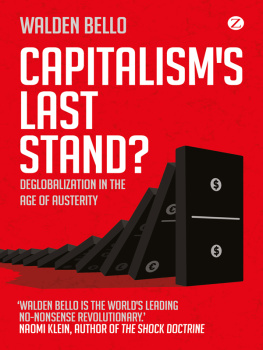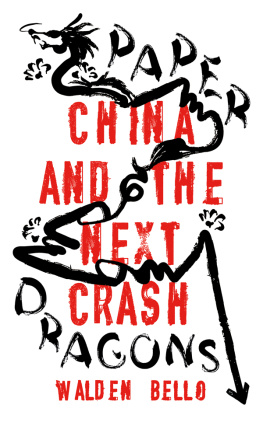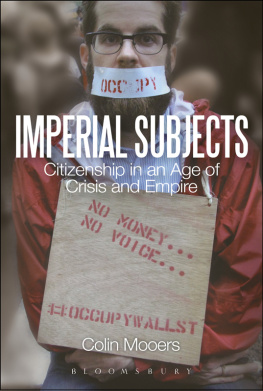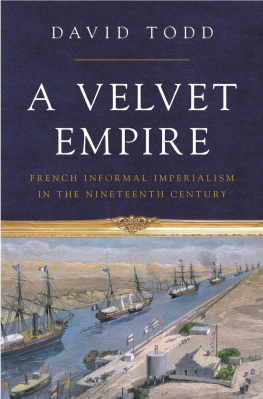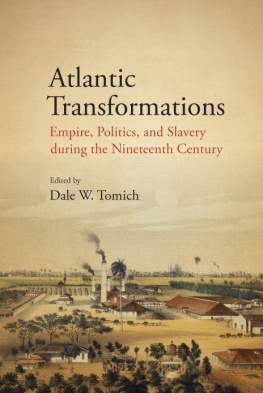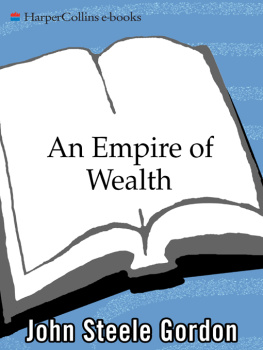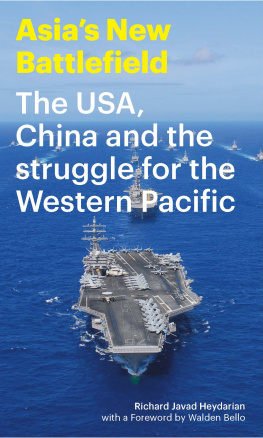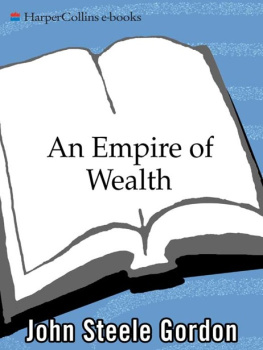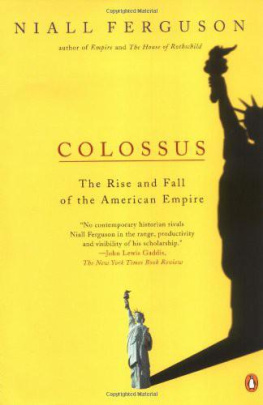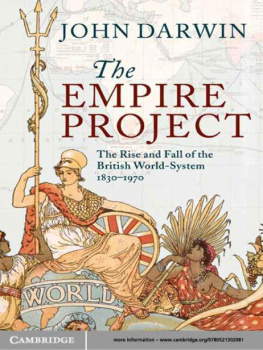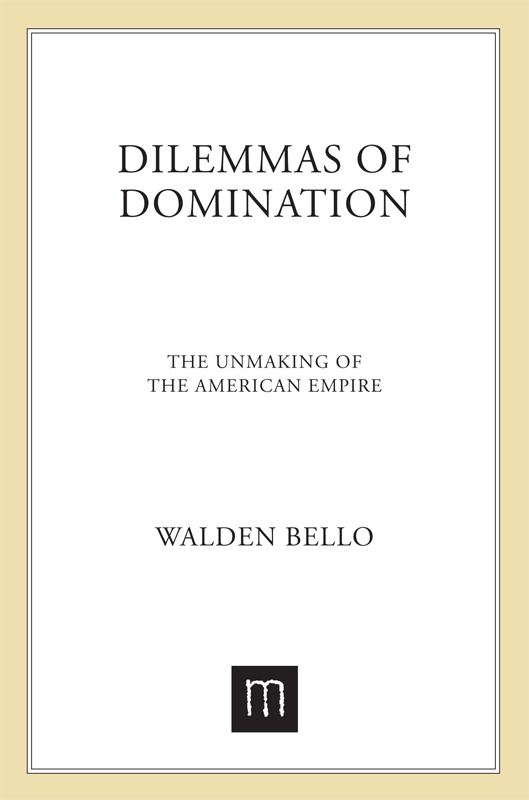
The author and publisher have provided this e-book to you for your personal use only. You may not make this e-book publicly available in any way. Copyright infringement is against the law. If you believe the copy of this e-book you are reading infringes on the authors copyright, please notify the publisher at: us.macmillanusa.com/piracy.
Contents
To

INTRODUCTION
A Southern Perspective on the Crisis of the Empire
On November 2, 2004, the most significant electoral contest in the world took place in the United States. Yet only 115 million people participated in an exercise that the British Broadcasting Corporation described as a truly global election, the results of which would drastically affect the future of the vast majority of the worlds people. To be exact, the choice of only slightly over 59 million people mattered in a decision of global consequence. Hundreds of millions outside the borders of the United States were rooting for the Democratic candidate, John Kerry, mainly because he was not George W. Bush, and they stood by helplessly as the latter won a second term owing to the support of people who saw the rest of the globe as a threat to their privileged status.
A not dissimilar situation existed over 2,000 years ago, when the fate of several million people who inhabited the area bounded by Spain in the West and Syria in the East, Gaul in the North, and Africa in the South was decided in factional struggles among a handful of citizens in the city of Rome. Like this earlier people, todays global population is hostage to the dynamics of political competition and political succession in an imperial republic.
This book is, first of all, written from the point of view of an observer from the global South, on the imperial periphery, where Washingtons far-flung legions are stationed to maintain global order. Only recently have Americans begun to think of their country as an empire. But for those of us subjected to repeated imperial interventionsincursions designed to uphold the interests of a distant powerempire is an everyday reality.
Why is this experience important? Because it profoundly affects the perspective that we bring to events. This notion became quite clear to me in the aftermath of September 11, 2001. At that time, the French newspaper Le Monde editorialized: We are all Americans now. It was speaking for the French, for Europeans maybe, but certainly not for somebody like me. My reaction to September 11 was expressed in an article I wrote a few days after the horrific event:
The assault on the World Trade Center was unpardonable, but it is important not to lose perspective, especially a historical one. The scale and consequences of the September 11 attack are massive indeed, but this is not the worst act of mass terrorism in U.S. history, as some U.S. media are wont to claim. The over 3000 lives lost are irreplaceable, but one must not forget that the atomic raids on Hiroshima and Nagasaki killed 210,000 people, most of them civilians, most perishing instantaneously. One may object that you cant compare the September 11 attack to the nuclear bombings since, after all, Hiroshima and Nagasaki were targets in a war. But why not, since the purpose of the nuclear bombings was not mainly to destroy military or infrastructure targets, but to terrorize and destroy the civilian population?
In contrast to the European reaction, I pointed out, the response to the September 11 event in the South was muted. A survey would probably reveal that
while many people in the Third World are appalled by the hijackers methods, they are not unsympathetic to their political objectives. As one Chinese-Filipino entrepreneur said, Its horrible, but on the other hand, the U.S. had it coming. If this reaction is common among middle class people, it would not be surprising if such ambivalence towards terrorism is widespread among the 80 per cent of the worlds population marginalized by current global political and economic arrangements.
The underlying motivation behind September 11, I suggested, was a sense of injustice and outrage. These two emotions were directed at the twin pillars of U.S. policy in the Middle East: first, the needs of the peoples of that region are subordinate to Americas strategic and economic interest in Middle Eastern oil; second, the United States must provide unstinting support for Israel. Unless the United States abandoned these policies and addressed the roots of terrorism in injustice and inequality, I argued, there will always be thousands of recruits for acts of terrorism.
At the time, these comments outraged many readers, a number of whom branded me as an apologist for terrorism. I suspect that the article would still strike a raw nerve among some readers in the North today.
What is more, my fundamental analytical approach has provoked heated disagreement. I take the view that the moment of greatest triumph for an individual, an institution, or a system may also exhibit its vulnerabilities. The shadow of defeat accompanies every victory. Winning the battle may accompany defeat in the larger war, as was the case with the United States Pyrrhic victory during the Tet Offensive in Vietnam.
A few days after George W. Bush landed on the deck of the USS Abra-ham Lincoln to declare American victory in Iraq on May 1, 2003, I wrote: This point may sound surreal after the massive firepower we witnessed [but] there is good reason to think that [the United States] is overextended. In fact, the main strategic result of the occupation of Iraq is to worsen this condition of overextension. Washingtons goal is to achieve overwhelming military dominance over any rival or coalition of rivals. This quest for even greater global dominance, however, inevitably generates opposition, and it is in this resistance that we see the roots of overextension.
If my analysis of September 11 aroused anger, the commentary on May 1 evoked ridicule from some readers, who saw it as the ultimate in wishful thinking. Which planet are you on? was not an uncommon reaction, even among some fierce critics of the United States. Today that counterintuitive view does not seem so strange after all.
CRISES OF GLOBAL CAPITALISM
This book, which is about the crisis of the American empire, is focused on the interrelated dilemmas of imperial economics and imperial politics. Actually, three crises threaten to convulse the empire: a crisis of overproduction, a crisis of overextension, and a crisis of legitimacy.
Crisis of Overproduction
The economic core of the empire is an expansive capitalist mode of production, one that is based on the extraction of profit from the accumulation and investment of capital. Today global capitalism is distinguished by the hegemony of the U.S. economy, both as a market for goods and as a destination for capital. Roaming the world, U.S. transnational corporations function as agents for capital accumulation and production. Their drive for profit makes capitalism both relentlessly expansive and prone to contradiction or to crises. One crisis is rooted in the contradiction between the increased consumption of natural resources and the production of waste and finite ecological space. A second stems from the more intense conflict between the minority in command of productive and financial assets and a majority with little control over these. Related to this is a third crisis, on which we shall focus our discussion: the widening gap between the growing productive potential of the system and the capacity of consumers to purchase its output. This gap has increased in recent years because of the radical free-market policies pushed by the global elite, which have depressed the incomes of working people in both the North and the South while concentrating wealth in the hands of a small minority. Termed variously as overproduction, overcapacity, or overaccumulation, this dynamic has resulted in declining growth rates in the center economies and disappearing profits in the industrial sector. It has also resulted in global financial speculation becoming the central source of profit and capital accumulation.


